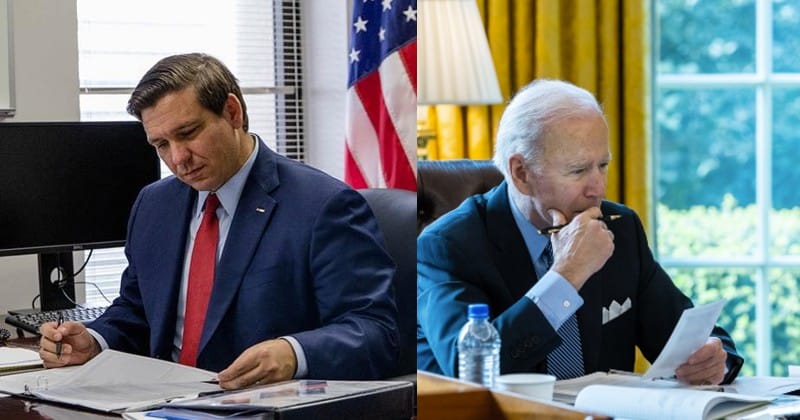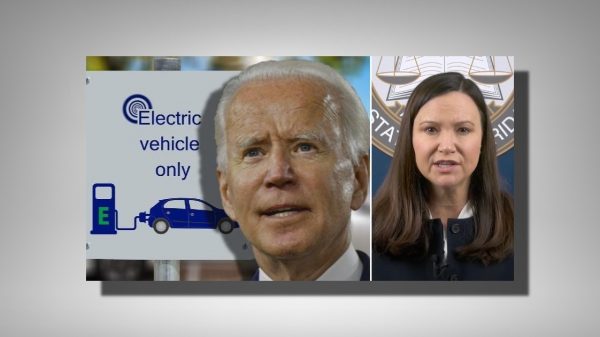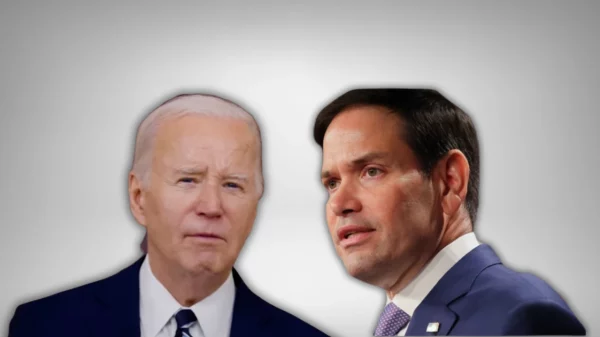Americans are sour. Check any poll, and the results are identical. Seven out of 10 Americans think the nation is on the “wrong track,” and trust in institutions is at an all-time low. Approval ratings for major party leaders, Trump and Biden, are stuck somewhere between those for Vladimir Putin and “animal cruelty.” Repelled by mainstream politics, a record 49 percent of voters now call themselves political independents. The coming “election of dread” provokes in Americans all the optimism of a hungover and rabid Eeyore.
Such indices induce hyperbole. From NPR and academia to Steve Bannon, observers and the “terminally online” routinely forecast violence and even civil war. Such conjecture is reckless. Middle-class nations with full employment and dynamic growth don’t spontaneously combust. Most Americans are too busy slurping a Starbucks Pink Drink at their kid’s tee-ball game to plan an insurgency. War is not on the horizon. But we do have a colossal and unremitting “case of the (political) Mondays.”
This moment and national mood are not without precedent. Distinct among democratic societies, Americans harbor a deep antipathy toward politics. We are, as a political scientist once noted, “antipolitical in our very bones.” This disposition periodically leads to a political cul-de-sac of hyper-partisanship (see: Age, Gilded). Indeed, the world is disordered and chaotic. Putin invades Ukraine. A novel virus dislocates normal life. The National League adopts the designated hitter. Things, as they are wont to do, go wrong. When they do, Americans won’t fault the Constitution; nor do they blame themselves; after all, “vox populi, vox Dei.” Instead, we castigate politicians. It is the American way. In 2023, we are caught, as we have been at other historical junctures, in a self-perpetuating cycle of toxic partisanship.
But there is an antidote. There exists a secret sauce that enables a Houdini-like escape from this political doom loop. Franklin Roosevelt and Ronald Reagan offer the template. FDR and the Gipper were ideological opposites. But the duo, as “Reconstructive Presidents,” swept away reigning political paradigms and built new, durable regimes. Elected and reelected in landslides, they enjoyed enduring popularity, which established persistent, stable majorities beyond their presidencies. This public esteem pushed hyper-partisanship out of the mainstream. Roosevelt and Reagan did so by connecting their politics to the historic American mission. To be sure, their policies offered tangible answers to the problems of the moment. But these programs were also embedded in the intangible. This combination is the secret sauce that makes for reconstructive presidencies – the antidote to the venom of hyper-partisanship.
In 1776, Thomas Paine proclaimed the American Revolution could put an end to “human bondage” and “begin the world over again.” George Washington was skeptical. But the post-revolutionary generation rushed to Paine’s standard. Corralling this idealism was Thomas Jefferson, who channeled it toward the construction of his “Empire for Liberty.” Regrettably, Jefferson’s “Empire for Liberty” was intended for whites only and was dominated by men. But Jefferson’s political success demonstrates a deep “muscle memory” in American politics. American citizenship, from the start, was no spectator sport. Voters expected, even craved, direct personal engagement in the American mission to “begin the world anew.”
Viktor Frankl understands Thomas Paine. The pioneering psychologist and Auschwitz survivor created a school of psychology from his death camp observations. In the camps, Frankl found that survival depended upon finding “meaning” amid the suffering. Beyond the Holocaust, he posited that “purpose” was not tertiary; it was, instead, the primary ingredient for human flourishing. In this way, reconstructive presidents don’t build enduring majorities by pure-and-simple programs and policies. They do so by enlisting voters in a political movement that offers meaning beyond the receipt of programmatic goodies.
Reconstructive presidents (Jefferson, Jackson, Lincoln, FDR, and Reagan) oversee political realignment. They come to office when events cause old paradigms to crumble. But in associating their ideological vision with the larger American mission, they offer voters something more than politics as usual. Exemplifying this was Abraham Lincoln. Elected by a bare plurality of voters, Lincoln became a reconstructive president by joining the Civil War with Paine’s vision. Rather than a fight to merely end slavery or secession, Lincoln transformed the Civil War into a battle to ensure that a “government of the people, by the people, for the people, shall not perish from the earth.”
Nearly 75 years later, FDR did much the same. In both the New Deal and the Second World War, Roosevelt founded his policies in the American mission. At the 1936 Democratic Convention, he enlisted voters into the fight. Declaring “this generation” of Americans had “rendezvous with destiny,” he transmuted New Deal political battles into a fight “for the survival of democracy.” In foreign policy, FDR maintained this universalist mantra. In January 1941, nearly a year before Pearl Harbor, Roosevelt sought to rally support for unpopular tax hikes, a reinstituted draft, and foreign aid. His “Four Freedoms Speech” wrapped these policies into a larger effort to “extend American ideals across the world.” In both instances, Roosevelt knotted his domestic and foreign policy vision to the historic American mission and made voters partners in this effort. In so doing, he established the basic political contours of postwar America.
Nearly fifty years hence, FDR’s vision had foundered. Stagflation at home and a post-Vietnam drift caused the New Deal coalition’s collapse. But the conservatism that replaced it bore Rooseveltian markings. It is no accident that Reagan echoed FDR’s themes. A New Deal Democrat as a youth, Reagan was marinated in rhetoric and ideas of Roosevelt’s America. Ironically, the Gipper, in his central vision of the American mission, remained rooted in his liberal past. Hugh Heclo termed it Reagan’s “Sacramental Vision.” A material phenomenon that expresses a spiritual reality, Reagan’s democratic nationalism extolled an America that drew strength from diverse peoples. It was the nation’s mission, in Reagan’s mind, to spread this vision abroad.
For decades, liberal intellectuals have struggled to ascertain the roots of Reagan’s appeal. Why and how did a tax-cutting Hollywood millionaire appeal to so many working-class Americans? The Gipper’s enduring popularity is found in connecting his conservative policies to the nation’s historic democratic mission. To be sure, policies mattered greatly. The Gipper’s tax cuts and deregulation, like New Deal programs, offered tangible benefits. During the Great Depression, Roosevelt offered jobs and hope to the unemployed millions. Likewise, Reagan’s policies sparked sustained economic growth following a decade of high unemployment and stagflation. Soaring vision flops if real-life basics don’t improve. But FDR and Reagan’s appeal transcended Social Security and tax cuts. Ebullient optimism and democratic idealism combined with policy success at certain historical junctures are the ingredients of reconstructive presidents. The results are electoral realignment, enduring majorities, and healthier partisanship.
Sermonizing about the American mission is decidedly old-fashioned. Educated liberals, who are now the brains of the Democratic Party, are reared on an educational diet of American sinfulness. Tragically, many urban progressives equate education with cosmopolitan alienation from mainstream American norms. Thus, liberal campaigns are little more than a laundry list of legislative goodies aimed at an array of disconnected constituency groups. Voting as a transactional practice to receive a benefit is cold and purposeless. But even more tragic is Trump’s Republican Party. Nihilist to its core, Trumpism is allergic to idealism and any sense of the American mission. Trumpism envisions an economy and a wider world of one against all, wherein catch-as-catch-can tactics are the rule of the day.
No wonder Americans detest politics. The secret sauce of American politics is the condiment equivalent of Thousand Island Dressing. In the late nineteenth century, it was the salad dressing of choice for upper-class Americans. A generation later, Thousand Island had become such a middle-American staple that McDonald’s made it the “secret sauce” for its Big Mac. The dressing’s ubiquity caused elite tastes to change. One food critic recently said of it, “You know that nothing you’re about to eat is good for you – bring out the Thousand Island dressing!” But the secret sauce must not offend middle-American palates too much. Americans consume 550 million Big Macs every year. Maybe, just maybe, American political culture would improve if politics were attuned to popular tastes – not elite palates or nihilist tendencies.
Jeffrey Bloodworth is a professor of American Political History at Gannon University and a fellow with the Jack Miller Center. This article was originally published by RealClearPolitics and made available via RealClearWire.















